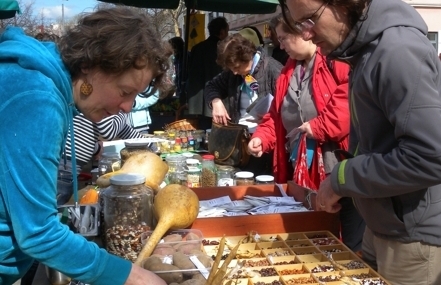52,899 signatures
The petition is accepted.
The petition was successful!
Petition is addressed to: , EU Commission, Parliament and Council members
Esteemed Members of the Commission, Esteemed Members of the Parliament, Esteemed Members of the Council!
New seed regulations are currently being drafted in Brussels. If the Directorate General for Health and Consumers’ plans become a reality, more old and rare varieties of fruits, vegetables and grains will disappear from the market. These diverse varieties and varieties adapted to organic agriculture are to be hampered by bureaucracy, while the power of corporate agriculture is further strengthened.
The currently available texts for the new EU seed regulation will promote a concentration of the seed market into the hands of a small number of seed industry corporations. This is unacceptable. A new EU seed regulation must allow diversity varieties, varieties for small-scale farming and ecologically adapted breeding. Diverse varieties must be available not only in gene banks, but on the open market too, without any bureaucratic restrictions.
Therefore we demand: no obligation for registration! Besides this, the current registration criteria must be lowered for varieties suitable for organic farming by virtue of their diversity, so our agriculture remains adaptable to climate change, new pests and diseases, as well as more environmentally friendly lifestyles.
Neither the current EU seed law nor the presently available informally submitted drafts for legal changes to the law fulfil these requirements. They threaten seed diversity and thereby mankind’s common agricultural heritage. They also threaten sustainable food systems and exist only to serve the agrochemical industry.
We urge you, EU Commission, Parliament and Council members, to reject any proposal that does not fulfil the above mentioned criteria! No more destruction of agricultural and horticultural seed diversity in Europe!
For more information visit:
Campaign for Seed-Sovereignty https://www.seed-sovereignty.org
German umbrella organisation for crop and livestock diversity („Dachverband Kulturpflanzen- und Nutztiervielfalt e.V.“): https://www.kulturpflanzen-nutztiervielfalt.org/node/29
German Association for the conservation of crop plants („Verein zur Erhaltung der Nutzpflanzenvielfalt e.V.“): https://www.nutzpflanzenvielfalt.de
Patrick Wiebe’s Blog: https://www.bifurcatedcarrots.eu/
Reason
The current EU seed regulations stem from a time in which environmental protection, nature and biological diversity were underestimated. There were numerous breeding enterprises which put an extensive diversity of varieties on the market. Most of these varieties could be re-sown after harvest, a technique which has existed for thousands of years, throughout agricultural history.
In the 1980s, two new terms had to be developed for what previously had just been common practice: firstly „farmers’ rights“ and secondly „open pollinated“ varieties (the seeds of which produce the same variety unless they cross with similar varieties). This is due to the fact that the seed market changed dramatically. Today, the ten biggest companies dominate three-quarters of the worlds’ seed market, and more than half of the global market comes from the chemical industry.
Most of the varieties are subject to legal and technical restrictions, which undermine re-sowing seed saved by the growers themselves. An official approval for the marketing of varieties was introduced, and the criteria for this are adapted to industrial varieties. Productivity and increasing world population were used to justify these developments. The comprehensive report of the International Assessment of Agricultural Knowledge, Science and Technology for Development (IAASTD) illustrates the instability of this approach.
Crop diversity has largely disappeared from the market. This concerns the diversity of non-registered varieties - they are traded by thousands of intrepid citizens in Europe without the required registration. Today, we rely on the extensive expertise of these people, and we should encourage the increasing amount of people engaging in this activity, not only as a hobby but also to generate income and a livelihood from it.
A second important aspect is that hardly any appropriate varieties have been bred specifically for organic agriculture by virtue of their diversity. However, organic farming needs plants that are powerful without chemicals. This is only possible with a wide-ranging, natural gene pool. Such varieties are routinely deemed to be unacceptable for registration under the current criteria for seed registration.
Share petition
Petition details
Petition started:
04/28/2013
Petition ends:
10/27/2013
Region:
European Union
Topic:
Economy
News
-
Petition wurde nicht eingereicht
on 12 Oct 2018Liebe Unterstützende,
der Petent oder die Petentin hat innerhalb der letzten 12 Monate nach Ende der Unterschriftensammlung keine Neuigkeiten erstellt und den Status nicht geändert. openPetition geht davon aus, dass die Petition nicht eingereicht oder übergeben wurde.
Wir bedanken uns herzlich für Ihr Engagement und die Unterstützung,
Ihr openPetition-Team -
Die Zeichnungsfrist ist beendet
on 12 Mar 2014Dear supporters pf our petition,
the EU-Parliament published the results of yesterdays votings on the Commissions proposal for a seed regulation, and other topics.
The correct numbers are as following:
voting 6 on the Commissions proposal: 15 yes; 615 no, 13 abstained;
voting 7 on the request for a referral: 574 yes, 90 no, 10 abstained;
voting 8 on the legislative resolution: 511 yes, 136 no, 16 abstained
(please notice: it was 511 yes and not only 51 as in the last mail wrongly written)
If you are interested in the question who voted how, you find the results of roll-call votes here: tinyurl.com/EP-voting-140311 on pages 16 to 21.
best regards
Andreas Riekeberg
Campaign for seed-sovereignty
www.seed-sovereignty.org -
Die Zeichnungsfrist ist beendet
on 12 Mar 2014Dear supporters!
We've made it! The Parliament of the EU has decided: the Commissions proposal for a seed regulation is politically dead. In yesterdays plenary session was adopted with 51 to 130 votes a legislative resolution, which rejects the proposal of 6 Mai 2013 very clear and calls the Commission to submit a new one.
Until the last moment it was unclear: would the Parliament adopt such a legally binding resolution or would it restrict itself to a simple appeal to the Commission to withdraw the proposal? This appeal in the so called rejection report got 650 to 15 votes. But the Parliament insisted in a voting on the legislative resolution with the above mentioned result.
By this the longstanding engagement of organisations and... further
Debate
No CONTRA argument yet.


